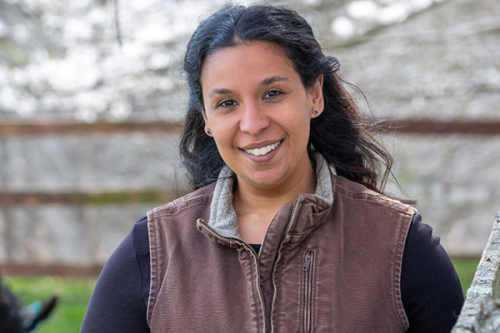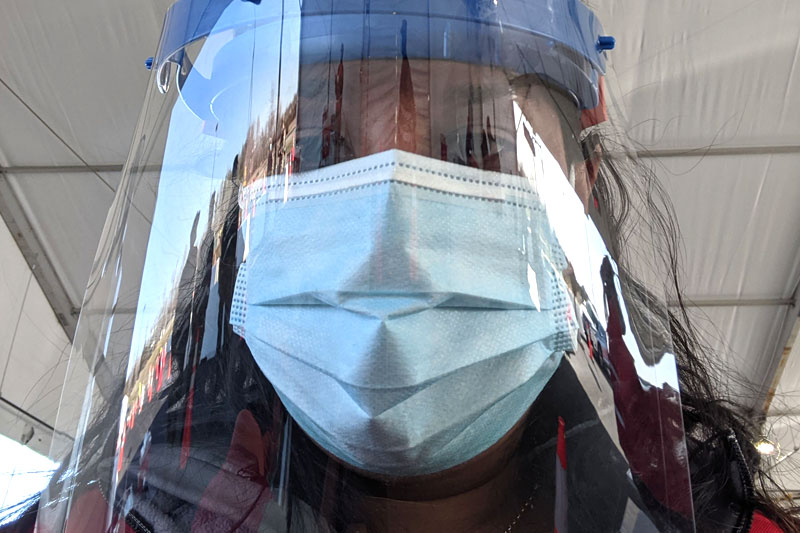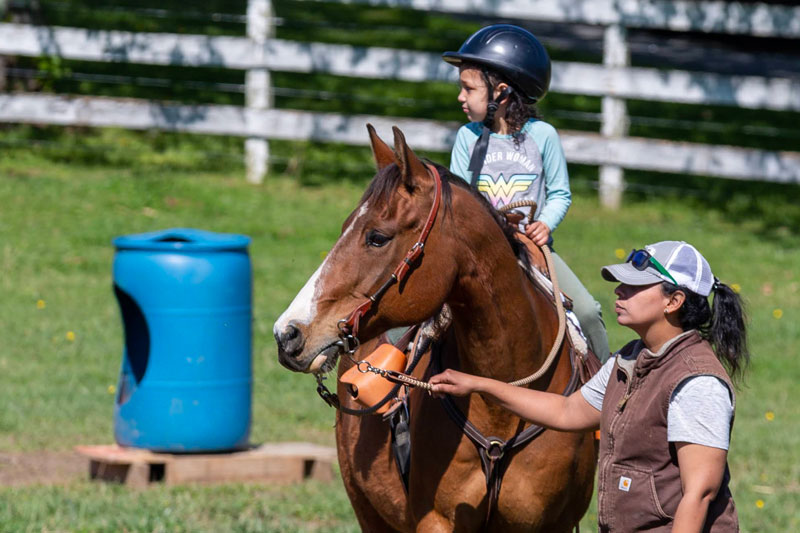Roxann Motroni

Dr. Roxann Motroni, DVM, Ph.D. is a mother, a cattle farmer, and the National Program Leader for Animal Health with the United States Department of Agriculture, Agricultural Research Service. Yup, we also weren’t sure how she gets it all done when we interviewed her! Roxann’s experience working with farmers and ranchers while doing her Ph.D. research on Epizootic Bovine Abortion (Foothill Abortion Disease) at UC Davis initiated her love for livestock, farming, and ranching. A placement with the Department of Homeland Security as an AAAS fellow took her to Washington, D.C. and helped open new opportunities working in Foreign Animal Disease research and vaccine development.
Veterinary School & Year Graduated: University of California, Davis, 2013
Additional Degree: Ph.D. in Comparative Pathology, University of California, Davis, 2012
Questions and Answers
- Tell me about your most challenging and rewarding veterinary jobs or work experiences.
- All of my jobs have been challenging and rewarding in different ways. In clinical practice, I got to experience immediate feedback when working with individual clients/patients. But I also saw preventable problems causing animals to suffer. That was really hard and caused me to burn out. In public practice, I love the fact that I get to work on big-picture problems and influence how animal health or veterinary medicine is practiced on a national and international scale. On the flip side, navigating bureaucracy is difficult and timing is everything. I’m learning to be patient and not expect immediate results.
- What did you love about the position or experience?
- My favorite aspect of my current position is working with world-class scientists in different fields on cutting-edge research. I love being able to bring groups of people from different backgrounds together to solve problems synergistically with a systems focus. I have a lot of fun brainstorming and creating solutions from different points of view.
- Tell me about your journey to get to that point in your life.
- I always knew I wanted to be a vet and at sixteen I had my first research experience in a comparative genomics lab through the Governor's School for Agriculture at Virginia Tech. I fell in love with research and this experience set the road for a dual degree DVM/Ph.D. I continued research through college then came to UCD SVM for my dual degree around the time of the West Nile Virus outbreak. I became very interested in the wildlife/livestock interface as well as disease transmission and pathogen evolution. I ended up in a lab studying foothill abortion which granted me the flexibility to work on whatever interested me including vaccine and diagnostics development, creating a mouse model to test vaccines more efficiently, field trials, as well as some molecular phylogeny work. My Ph.D. got me working with ranchers and initiated a love for livestock, farming, and ranching. I focused on livestock and food animals in my clinical years then ended up at a large animal ambulatory internship at the University of Tennessee. I had a microbiology residency and postdoc lined up but then a mentor suggested a Science and Technology Policy fellowship with AAAS Science & Technology that I ended up taking. Following my fellowship, I was hired on with the Department of Homeland Security (DHS) where I managed the research program on foreign animal disease (FAD) research on Plum Island. Now I work with USDA ARS focusing on basic and applied research for both endemic and exotic livestock diseases. It's one of those things where you sort of wonder, is it just you following your own interests, or do your interests sort of find you?
- As a veterinary student, did you ever imagine yourself taking this journey and having these professional experiences?
- There is no way I could have planned for this because I didn’t know this job existed! It was about getting the right skills and then being in the right place at the right time. I never imagined living and working in Washington DC for my DHS job but I was always interested in research from a young age.
- In retrospect, what do you wish you’d known as a veterinary student or early in your career?
- I’ve realized that all the people that I looked up to and all the people that I thought had made it didn't know what they were doing either. There's not this point in your life where you suddenly have it all figured out, in fact, that pretty much never comes. I think you just get a little bit more risk-tolerant and recognize that you're going to have the ability to change and you will change. Now I'm coming to realize nobody knows what their plan is and they're all just making it up. I probably would have had far fewer ulcers if somebody had sat me down and told me that earlier on.
- Would you have changed anything about your time in veterinary school?
- I wish I practiced more surgeries, especially small animal surgery. I was never very comfortable with small animal surgery and I wish I tried to conquer that.
- Would you have changed anything about your career path since graduating?
- I still wonder about taking the microbiology residency and sometimes wish that I had more in-depth knowledge. That additional knowledge is not needed for my current position but it could have been helpful.
- Did you have any mentors or role models along the way that helped or inspired you? Please provide an example of how they helped you or what qualities they had that made them a good mentor? How did you find them?
- I am a huge fan of mentorship and I have different mentors for different areas of my career. I have a research mentor, large animal clinician mentors, motherhood mentors, government mentors and they are all great role models. You can find them by being proactive, reaching out to people you find interesting, and getting to know them over a cup of coffee or lunch, and conducting informational interviews.
- Tell me about any pivotal moments or key turning points that shaped your career.
- Getting the AAAS scholarship and fellowship was a major unexpected turning point that created an opportunity for networking that led to my DHS job.
- Tell me about one or two challenges, setbacks, or obstacles that you faced along the way on your professional journey. How did you address those?
- The greatest obstacles were the ones within my own mind like shying away from challenges, self-doubt, and imposter syndrome. I have been working on overcoming my own mental hurdles by addressing them and talking about them.
- What was the most important lesson you learned as a veterinarian, and still remember today, and would want to tell vet students about?
- Being a veterinarian is a part of who you are, but it's not everything that you are and you have to make sure that you leave space and time in your life to cultivate the things that feed you. We are all very deeply rooted in a love of Veterinary Medicine but don't let it be the whole definition of who you are as a person.
- What’s been the biggest highlight of your career so far?
- I hope that it’s still coming. I won that AVLD Manuscript of the Year Award in grad school, which was a great professional achievement, but I still hope the best is yet to come. No poverty, hunger and good health (reliance on agriculture, FAD), water, economy (via agriculture), global warming (via food animal research), aquaculture/fisheries (not her directly but projects at USAID), connections and partnerships allows for more expansive impact
- Is there anything else you’d like to tell me that you think would be helpful or relevant to veterinary students or early-career veterinarians?
- It’s important to see yourself as a whole person, look at your life experiences and skills and figure out how to turn those into a career you want. When you define yourself as a veterinarian, you tend to think that your job skills are your clinical skills but the longer I've been out the more I've realized that communication skills, written skills, all of these other things that I never really thought were skills are actually what I get paid for. I think you can get stuck in this feeling that you can't go anywhere else because this is all you know but if you take a step back and look at all of your life experiences, all the things that you've done, you can try to figure out how to transform that into the career that you want to have.


